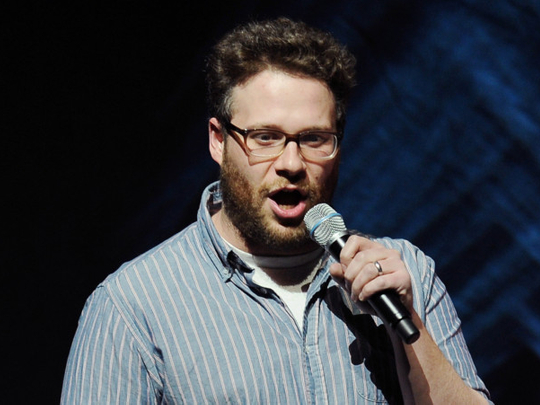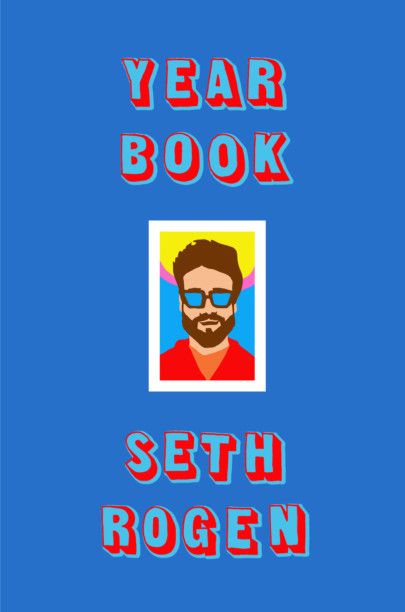
In ‘Yearbook’, Seth Rogen’s candid collection of sidesplitting essays, the actor and filmmaker recalls being dumped three days into his first relationship, then penning a standup joke about that fleeting flirtation. Rogen was 16, and he fondly looks back on that set as the first time he converted anguish into comedy. “I was proud of it,” he writes. “Probably way too proud.”
Rogen, now 39 and a seasoned veteran of mining his pain for others’ amusement, still subscribes to that comic code. That much is clear in his episodic memoir, which skims past his career-defining success stories — “Freaks and Geeks,” “Knocked Up” and “This Is the End” among them — but dedicates entire chapters to critical misfires “The Green Hornet” and “The Interview.”

And “Yearbook” is all the better for it. Rather than a check-the-boxes origin story or didactic scroll through his IMDb page, Rogen opts for a non-linear assortment of anecdotes that highlights his sardonic wit, knack for mischief and find-the-humour-in-life ethos. Throw in Rogen’s proclivity for well-timed profanity, and this book thrives at both explaining and encapsulating a generational comedic voice.
That said, a built-in knowledge of Rogen and appreciation for his stoner humour is recommended, because there is almost no recapping of his filmography or public persona. (Plus it’s a delight to read the text with his cadence and hearty laugh in mind.) When Rogen mentions two kids he spotted across the room at a Vancouver area bat mitzvah decades ago and reveals them as Evan Goldberg and Sammy Fogell, “Superbad” fans will cheer. A story about Jerry Seinfeld dropping in at a Los Angeles comedy showcase and forcing a young Rogen to follow his act will have “Funny People” fans nodding in recognition. Yet, for the unfamiliar, the author rarely spells out how these events influenced his work.
Rogen opens the book not with a Hollywood-spun yarn, but ruminations on his endearingly eccentric parents and grandparents. His father — described as OCD, very liberal and “simultaneously bald and always in dire need of a haircut” — is lovingly roasted with particular vigour. “Yearbook” then progresses to a slew of youthful misadventures.
It speaks to Rogen’s storytelling prowess and eventful adolescence that by the time he gets to his Hollywood experience, one almost forgets that this is, in fact, a celebrity story. At the risk of alienating many a megastar, Rogen promptly gets blunt. A loopy conversation with George Lucas, when the “Star Wars” mastermind seemed to be sincerely preparing for the apocalypse in 2012, is eye opening. The saga of “The Green Hornet’s” troubled pre-production features a disastrous dinner with Nicolas Cage, who was up for the villain role but purportedly pitched the character as a White Bahamian, then years later asked if James Franco snatched the idea for “Spring Breakers.” Dealings with Tom Cruise, Kanye West and Steve Wozniak feel similarly on the nose — so much so that they almost play like too-good-to-be-true satire.
When Rogen gets to “The Interview,” the Sony hack and the North Korea-centric comedy’s cancelled theatrical release, he offers a sobering glimpse of the studio system’s fickle machinations. Although politics aren’t a defining aspect of “Yearbook,” Rogen doesn’t shy from current events. Whether he is expressing frustration with the stigmatisation of marijuana, bemoaning antisemitic rhetoric on Twitter or reflecting on the Capitol insurrection, he is brief but pointed.
Naturally, Rogen’s relationship with weed is baked into the text.
All along, clever set-ups and payoffs permeate Rogen’s prose, which is punctuated by absurdist illustrations from artist Son of Alan. Most important, Rogen understands the value of the unexpected laugh, when a sentence takes such a startling turn that the reader can only cackle. But considering Rogen’s comic credentials, it should come as no surprise that “Yearbook” deserves such superlatives.









